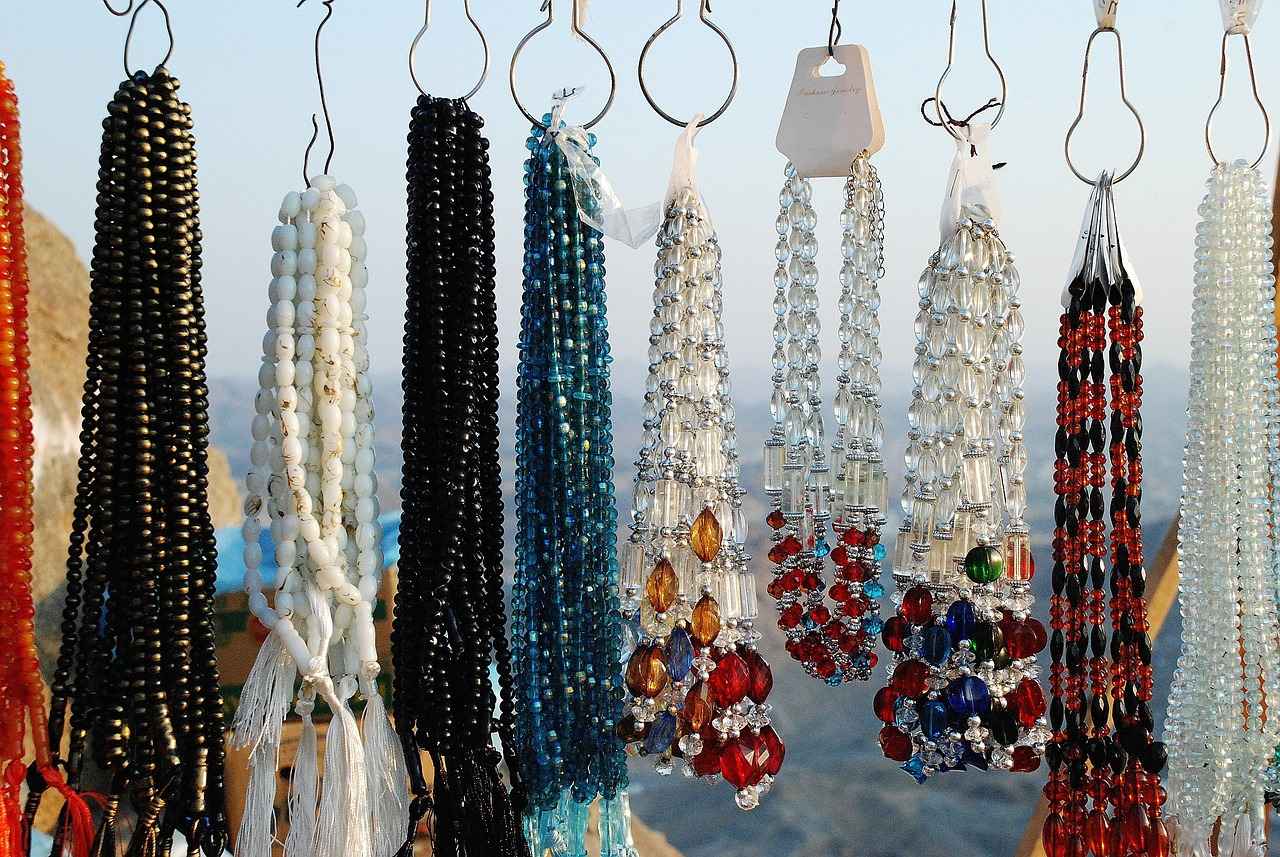This article explores the fascinating world of pearl necklaces, delving into their historical significance, cultural importance, and the longest strands ever created. Discover the artistry and stories behind these remarkable treasures.
The History of Pearl Necklaces
Pearl necklaces have a rich history that dates back thousands of years. The earliest records of pearl jewelry can be traced to ancient civilizations such as the Egyptians, who adorned themselves with pearls as symbols of wealth and status. Over time, pearls became synonymous with luxury and were often worn by royalty. The craftsmanship involved in creating pearl necklaces evolved significantly, with artisans developing intricate techniques to string pearls in various styles, making them a staple in jewelry collections around the world.
Famous Pearl Necklaces in History
Throughout history, several iconic pearl necklaces have captured public imagination. For instance, the famous “La Peregrina” pearl necklace, once owned by Spanish royalty, has a storied past that includes ownership by Hollywood star Elizabeth Taylor. Such pieces not only showcase the allure of pearls but also reflect the cultural and social dynamics of their times. The historical significance of these necklaces often transcends mere aesthetics, making them valuable artifacts of cultural heritage.
The Art of Pearl Cultivation
Pearl cultivation is a meticulous process that transforms oysters into sources of exquisite pearls. The journey begins with the careful selection of oysters, which are implanted with a small bead or piece of tissue to stimulate pearl production. This process can take several years, and the conditions in which the oysters are raised significantly affect the quality of the pearls. Modern techniques have improved both the quality and quantity of pearls produced, making pearl farming a vital part of the jewelry industry.
Longest Pearl Necklaces Ever Created
The record for the longest pearl necklace is a remarkable feat of craftsmanship. The current record holder, created in 2017, measures an astonishing length of over 100 meters and consists of thousands of meticulously strung pearls. This section discusses the artisans behind these extraordinary creations and the dedication required to achieve such a remarkable length. The stories of these necklaces often highlight the cultural significance of pearls in various societies, celebrating their beauty and craftsmanship.
Different Types of Pearls
Not all pearls are created equal. This section explores the various types of pearls, including freshwater, saltwater, and cultured pearls, each with unique characteristics. Freshwater pearls are often more affordable and come in a variety of colors, while saltwater pearls, such as Akoya and Tahitian, are known for their luster and rarity. Cultured pearls are created through human intervention, making them more accessible to consumers. Understanding these differences is essential for anyone looking to purchase or appreciate pearl jewelry.
The Cultural Significance of Pearls
Pearls have held symbolic meaning across various cultures. In many societies, they are associated with purity, wisdom, and femininity. For instance, in Asian cultures, pearls are often seen as symbols of wealth and are used in traditional weddings. This section examines how pearls are perceived in different societies and their roles in traditions and rituals, highlighting their enduring legacy as precious gemstones.
How to Care for Pearl Necklaces
Proper care is essential for maintaining the beauty of pearl necklaces. Pearls are delicate and require specific care to ensure their longevity. This section provides practical tips on cleaning, storing, and preserving pearls, emphasizing the importance of avoiding harsh chemicals and extreme temperatures. By following these guidelines, pearl owners can keep their treasured necklaces looking beautiful for generations.
The Value of Pearls in the Jewelry Market
The value of pearls can vary significantly based on several factors, including type, size, shape, and luster. This section discusses what influences pearl pricing and how to assess the value of a pearl necklace. Understanding these factors can empower consumers to make informed decisions when purchasing pearls, ensuring they invest in pieces that reflect both quality and beauty.
Celebrity Pearl Necklace Trends
In recent years, celebrity influences have shaped pearl necklace trends. From modern interpretations to classic designs, celebrities have redefined how pearls are worn, making them a popular choice in contemporary fashion. This section analyzes popular styles worn by celebrities and how they impact fashion, showcasing the versatility of pearls in various settings.
Jewelry Designers and Their Signature Pearl Pieces
Many renowned jewelry designers have created iconic pearl pieces that have left a lasting impact on the industry. This section highlights some of the most influential designers and their contributions to pearl jewelry, showcasing unique designs that continue to inspire new generations of jewelers. Their artistry not only elevates the status of pearls but also introduces innovative styles and techniques.
DIY Pearl Necklace Projects
Creating your own pearl necklace can be a rewarding experience. This section offers step-by-step instructions and tips for crafting beautiful pearl jewelry at home. From selecting the right materials to learning basic stringing techniques, readers can discover the joy of designing their own pearl creations, allowing for personal expression and creativity.
Future Trends in Pearl Jewelry
As fashion evolves, so do the trends in pearl jewelry. This section explores emerging styles and innovations in pearl design, predicting what the future holds for pearl enthusiasts. From sustainable practices in pearl farming to the integration of technology in jewelry design, the future of pearl jewelry is bright and full of possibilities.

The History of Pearl Necklaces
Pearl necklaces have a rich and storied history that spans thousands of years, captivating the hearts and minds of people across various cultures. The allure of pearls is not merely due to their natural beauty but also their deep-rooted significance in human history. From ancient civilizations to modern fashion, pearls have played a vital role in the evolution of jewelry.
- Ancient Civilizations: The use of pearls can be traced back to ancient Egypt, where they were revered as symbols of wealth and status. Archaeological findings suggest that pearls were worn by royalty and used in burial artifacts, signifying their importance in both life and death.
- Trade and Exploration: During the Roman Empire, pearls became a valuable commodity, traded across continents. The Silk Road facilitated the exchange of pearls, making them accessible to various cultures and enhancing their desirability.
- Symbolism in Cultures: In many societies, pearls symbolize purity, wisdom, and femininity. In Asia, they are often associated with the moon and have been used in traditional ceremonies, highlighting their cultural significance.
- The Renaissance and Beyond: The Renaissance period marked a resurgence in the popularity of pearls. They adorned the necks of nobility and were often featured in portraits, showcasing their status as a luxury item.
The craftsmanship involved in creating pearl necklaces has evolved dramatically over time. Initially, natural pearls were harvested from the ocean, requiring skilled divers and extensive knowledge of marine environments. As demand grew, so did the methods of cultivation.
Modern Pearl Cultivation has revolutionized the industry. Techniques such as the introduction of nucleation in oysters have allowed for the mass production of cultured pearls. This innovation has made pearls more accessible to the general public, shifting their perception from exclusive luxury to a more widely appreciated gemstone.
In contemporary society, pearl necklaces continue to hold a place of significance in fashion and culture. They are often associated with elegance and sophistication, worn by celebrities and featured in high-end jewelry collections. The versatility of pearls allows them to complement various styles, from classic to modern.
Moreover, the enduring popularity of pearl necklaces can be attributed to their timeless appeal. They are often passed down through generations, becoming heirlooms that carry not just aesthetic value but also sentimental significance.
As we explore the history of pearl necklaces, it becomes evident that these exquisite pieces are more than mere adornments; they are a testament to human creativity, cultural heritage, and the enduring allure of nature’s treasures. The evolution of pearl necklaces reflects changes in societal values, artistic expression, and the complex relationship between humans and the natural world.

Famous Pearl Necklaces in History
Throughout the ages, pearl necklaces have not only adorned the necks of the elite but have also become symbols of wealth, prestige, and beauty. These exquisite pieces often tell stories that span generations, capturing the fascination of art lovers, historians, and fashion enthusiasts alike. Let’s delve into some of the most iconic pearl necklaces that have left an indelible mark on history.
- The Pearl Necklace of Queen Elizabeth I: This stunning piece, known for its intricate design and rich history, is believed to have been a gift from a Spanish ambassador. It features a series of large, lustrous pearls that symbolize the queen’s power and elegance. Elizabeth I was known for her love of pearls, often wearing them as a statement of her royal status.
- The La Peregrina Pearl Necklace: Once owned by Spanish royalty, this remarkable pearl has a history that dates back to the 16th century. It was later gifted to actress Elizabeth Taylor by her then-husband, Richard Burton. The necklace features the iconic La Peregrina pearl, which is one of the largest and most famous pearls in the world, surrounded by diamonds and rubies, showcasing a stunning blend of luxury.
- The Napoléon Pearl Necklace: This necklace belonged to Empress Joséphine, the first wife of Napoléon Bonaparte. The piece is notable for its exquisite craftsmanship and the use of natural pearls, which were rare at the time. It serves as a testament to the fashion of the early 19th century and the opulence associated with the Napoleonic era.
- The Cartier Pearl Necklace of the Duchess of Windsor: This necklace, created by the renowned jeweler Cartier, was famously worn by the Duchess of Windsor, Wallis Simpson. Known for her bold fashion choices, the Duchess’s pearl necklace featured a unique design that combined both classic and modern elements, reflecting her style and the changing fashion landscape of the time.
- The Pearl Necklace of Princess Diana: A beloved figure in the royal family, Princess Diana often wore a stunning pearl choker that captured public attention. This piece, which featured a cluster of pearls surrounded by diamonds, was frequently paired with her elegant gowns, symbolizing her grace and timeless style.
These necklaces are more than just accessories; they are historical artifacts that reflect the cultural significance of pearls throughout history. Each piece carries a story, intertwining the lives of those who wore them with the societal norms and artistic expressions of their times. As we explore these famous pearl necklaces, we gain insight into the evolving perceptions of beauty, wealth, and status, illustrating how pearls have transcended mere adornment to become symbols of legacy and power.
In summary, the allure of pearl necklaces continues to captivate us, reminding us of their storied past and the enduring fascination they hold in the world of fashion and history.

The Art of Pearl Cultivation
Pearl cultivation, often referred to as pearl farming, is a highly specialized and intricate process that has evolved significantly over the years. It involves nurturing oysters in a controlled environment to produce beautiful pearls, a journey that requires both artistry and scientific understanding. This section delves into the various methods and techniques employed in modern pearl farming, highlighting the dedication and expertise that go into creating these exquisite gems.
Understanding the Basics of Pearl Formation
To appreciate the art of pearl cultivation, it is essential to understand how pearls form. When an irritant, such as a grain of sand, enters an oyster, it triggers a natural defense mechanism. The oyster secretes layers of nacre, a substance that coats the irritant, resulting in the formation of a pearl over time. This natural process is the foundation of pearl farming, where cultivators aim to replicate and enhance these conditions for optimal pearl production.
Selection of Oysters
The first step in pearl cultivation is the careful selection of oyster species. Different species produce varying types of pearls, with the most common being the Akoya, Tahitian, and South Sea oysters. Each type has distinct characteristics, influencing the color, size, and luster of the pearls produced. Farmers must choose the right oysters based on their desired pearl attributes and the environmental conditions of their farming locations.
Grafting Techniques
One of the most critical aspects of pearl farming is the grafting process, where a small piece of mantle tissue from a donor oyster is implanted into a recipient oyster along with a nucleus, typically made from a shell bead. This technique encourages the oyster to produce a pearl around the nucleus. There are various grafting methods, including the single graft and double graft, each with its advantages and challenges. The skill of the technician performing the grafting is vital, as it directly affects the success rate of pearl production.
Environmental Factors
The environment in which pearl oysters are cultivated plays a pivotal role in the quality of the pearls. Factors such as water temperature, salinity, and nutrient levels must be carefully monitored and managed. Farmers often utilize floating rafts or underwater cages to provide a stable habitat for the oysters, ensuring they are protected from predators and environmental fluctuations. Regular maintenance and observation are crucial to fostering a healthy ecosystem for the oysters.
Harvesting and Quality Assessment
After a period of 6 months to several years, depending on the type of pearl being cultivated, the oysters are harvested. This is a delicate process, as farmers must handle the oysters carefully to avoid damaging the pearls. Once harvested, the pearls are cleaned and assessed for quality based on criteria such as size, shape, color, and luster. The grading process is essential for determining the market value of the pearls and ensuring that only the finest specimens reach consumers.
Innovations in Pearl Farming
As the demand for pearls continues to grow, so does the need for innovation in pearl farming techniques. Advances in technology, such as the use of underwater drones for monitoring oyster health and the implementation of sustainable farming practices, are shaping the future of pearl cultivation. These innovations not only improve efficiency but also contribute to the environmental sustainability of the industry.
The Cultural Significance of Pearls
Beyond their aesthetic appeal, pearls hold significant cultural value in many societies. They are often associated with purity, elegance, and wealth, making them a popular choice for jewelry and gifts. Understanding the cultural context of pearls enhances their allure and underscores the importance of ethical and sustainable practices in pearl cultivation.
In conclusion, the art of pearl cultivation is a fascinating blend of nature and human ingenuity. From the careful selection of oysters to the innovative techniques employed in farming, each step in the process is crucial for producing the stunning pearls that have captivated hearts for centuries. As the industry continues to evolve, the commitment to quality and sustainability remains at the forefront of pearl farming, ensuring that future generations can enjoy these remarkable gems.

Longest Pearl Necklaces Ever Created
The world of pearl necklaces is not only rich in history but also filled with remarkable achievements in craftsmanship. Among these achievements, the record for the longest pearl necklace stands out as an extraordinary feat that showcases the dedication and skill of artisans. Currently, the record is held by a stunning necklace that stretches an impressive length, composed of thousands of meticulously selected pearls.
- The Current Record Holder: As of now, the record for the longest pearl necklace is held by a creation measuring over 100 meters. This remarkable piece was crafted by a team of skilled artisans who spent years sourcing the finest pearls from various regions.
- The Story Behind the Creation: The journey of creating such an extensive necklace began with a vision to celebrate the beauty of pearls. The artisans collaborated with pearl farmers to select pearls that varied in size, color, and luster, ensuring that the final product was not only long but also visually stunning.
- Craftsmanship and Techniques: The process of assembling the necklace involved intricate techniques that have been passed down through generations. Each pearl was hand-knotted to provide durability and prevent damage, a testament to the craftsmanship involved.
The significance of the longest pearl necklace extends beyond its physical dimensions. It serves as a symbol of cultural heritage, representing the artistry and dedication of those who have contributed to the world of pearl jewelry. Throughout history, pearls have been associated with wealth, status, and beauty, making such a creation not just a piece of jewelry, but a legacy.
In addition to the record holder, there are other notable pearl necklaces that have made their mark in history. For instance, the famous “La Peregrina” necklace, once owned by Queen Mary I of England, is renowned for its unique pear shape and historical significance. Such pieces often inspire contemporary jewelers to push the boundaries of design and craftsmanship.
As we explore the realm of pearl necklaces, it becomes evident that the longest strands are not merely a display of length but a celebration of the artistry involved in their creation. Each pearl tells a story, and together, they weave a narrative that transcends time and culture, making the longest pearl necklaces a remarkable achievement in the world of jewelry.
In conclusion, the journey of the longest pearl necklace reflects a blend of tradition, craftsmanship, and a deep appreciation for the beauty of pearls. It encapsulates the essence of what makes pearl jewelry so cherished across different cultures and eras, serving as a reminder of the enduring allure of these exquisite gems.

Different Types of Pearls
When it comes to pearls, it is essential to understand that not all pearls are created equal. The world of pearls is diverse, featuring various types that differ in origin, appearance, and value. This section will explore the three primary categories of pearls: freshwater pearls, saltwater pearls, and cultured pearls, highlighting their unique characteristics and the factors that contribute to their beauty.
- Freshwater Pearls: These pearls are primarily produced in freshwater mussels, predominantly found in lakes and rivers. Freshwater pearls are known for their irregular shapes and wide range of colors, including white, pink, lavender, and even gold. They are typically less expensive than saltwater pearls, making them an attractive option for many jewelry enthusiasts. The nacre quality of freshwater pearls can vary, but they often exhibit a beautiful luster and can be found in both natural and dyed forms.
- Saltwater Pearls: Saltwater pearls are cultivated in the ocean, primarily in oysters. The most famous types include Akoya, Tahitian, and South Sea pearls. These pearls are generally rounder and have a higher luster compared to their freshwater counterparts. Akoya pearls are known for their classic white color with a reflective sheen, while Tahitian pearls are celebrated for their dark hues and exotic colors, ranging from black to peacock green. South Sea pearls, often the most expensive, are large and come in shades of white and gold, renowned for their impressive size and deep luster.
- Cultured Pearls: The majority of pearls available in the market today are cultured pearls, which are formed through human intervention. This process involves implanting a bead or piece of tissue into an oyster or mussel, prompting it to produce a pearl. Both freshwater and saltwater pearls can be cultured. The quality of cultured pearls is determined by factors such as nacre thickness, shape, and surface quality. Cultured pearls can be further categorized into natural and artificial based on their formation process.
In addition to these primary categories, pearls can also be classified based on their size, color, and luster. The size of a pearl is measured in millimeters, with larger pearls often commanding higher prices. Color is influenced by the type of oyster or mussel and the environment in which they are cultivated. Luster refers to the shine and reflective quality of the pearl’s surface, which is a crucial factor in determining its overall value.
Understanding the differences among these types of pearls is vital for anyone looking to purchase or appreciate pearl jewelry. Each type brings its own charm and character, making pearls a timeless and versatile choice for adornment.

The Cultural Significance of Pearls
Pearls have long been regarded as one of the most valuable gemstones in the world, treasured not only for their beauty but also for their cultural significance. Across various societies, pearls have been imbued with meanings that often reflect the values and traditions of those cultures. This section explores the multifaceted roles that pearls play in different societies, highlighting their importance in rituals, traditions, and symbolism.
In many cultures, pearls symbolize purity, innocence, and wisdom. In ancient China, for example, pearls were associated with the moon and were believed to possess protective qualities. They were often used in royal adornments, signifying the status and power of the wearer. Similarly, in the Middle East, pearls have been a symbol of wealth and luxury, often featured in the jewelry of the elite.
- Weddings: In many cultures, pearls are a traditional gift for brides, symbolizing the purity of the bride and the new beginnings of marriage.
- Funerals: In some cultures, pearls are worn during mourning as a sign of grief and remembrance, reflecting the belief in the soul’s journey.
- Religious Ceremonies: Pearls are often incorporated into religious rituals, representing spiritual enlightenment and divine connection.
Pearls have also played a significant role in art and literature, often symbolizing beauty and transience. Renowned works such as The Pearl by John Steinbeck highlight the duality of pearls as both a source of wealth and a symbol of greed. Artists throughout history have used pearls in their works to convey complex themes of desire and loss.
In contemporary culture, pearls continue to be celebrated for their elegance and versatility. Fashion designers often incorporate pearls into modern jewelry, blending traditional meanings with innovative designs. Today, pearls are not only seen as symbols of wealth but also as expressions of personal style, making them relevant in current fashion trends.
As we explore the cultural significance of pearls, it becomes clear that these exquisite gems are more than just beautiful adornments. They carry deep meanings that resonate across time and geography, reflecting the values and beliefs of the societies that cherish them.

How to Care for Pearl Necklaces
Proper care is essential for maintaining the beauty and longevity of pearl necklaces. These stunning pieces of jewelry require a bit more attention than other types of gems due to their organic nature. Below are some practical tips on cleaning, storing, and preserving your pearls.
- Cleaning Your Pearls: To keep your pearl necklace looking its best, it’s crucial to clean it regularly. Use a soft, damp cloth to gently wipe each pearl after wearing. This helps remove any oils, dirt, or makeup that may have accumulated. Avoid using harsh chemicals or ultrasonic cleaners, as they can damage the delicate surface of the pearls.
- Storing Pearls Properly: When not in use, store your pearls in a soft pouch or a separate compartment in your jewelry box. This prevents them from scratching against other jewelry. It’s best to keep them away from direct sunlight and extreme temperatures, which can cause the pearls to dry out and lose their luster.
- Stringing and Restringing: Pearls are often strung on silk thread, which can wear over time. It’s advisable to have your pearl necklace restrung every few years, especially if worn frequently. This ensures that the pearls are secure and reduces the risk of losing them.
- Avoiding Contact with Chemicals: Pearls are sensitive to chemicals found in perfumes, hairsprays, and lotions. Always apply these products before putting on your pearl jewelry, and allow them to dry completely. This precaution helps preserve the natural beauty of the pearls.
- Wearing Pearls Regularly: Surprisingly, wearing your pearls can help maintain their luster. The natural oils from your skin can enhance their shine. However, be cautious of wearing them during activities that may expose them to sweat or harsh conditions.
To further enhance the longevity of your pearl necklace, consider the following:
1. Store pearls in a cool, dry place.2. Avoid exposing them to high humidity.3. Clean pearls with a soft, damp cloth after each use.4. Keep pearls away from direct sunlight.5. Restring pearls regularly to prevent breakage.
By following these simple yet effective care tips, you can ensure that your pearl necklaces remain as beautiful as the day you acquired them. Regular maintenance not only preserves their appearance but also enhances their sentimental value, allowing you to enjoy these timeless treasures for years to come. Remember, pearls are not just jewelry; they are heirlooms that can be passed down through generations, carrying stories and memories along with them.

The Value of Pearls in the Jewelry Market
Pearls have long been revered as one of the most coveted gemstones in the world of jewelry. Their **value** can fluctuate significantly based on a multitude of factors that potential buyers should understand. This section aims to dissect the elements that influence pearl pricing and provide insights on how to accurately assess the value of a pearl necklace.
- Type of Pearl: The classification of pearls plays a crucial role in determining their worth. There are various types, including freshwater, saltwater, and cultured pearls. Generally, saltwater pearls, such as Akoya, South Sea, and Tahitian pearls, tend to be more valuable due to their rarity and the intricate process required for their cultivation.
- Size: The size of a pearl is another significant factor. Larger pearls are generally more valuable than smaller ones, as they are rarer. For instance, pearls that are over 10mm in diameter can command much higher prices.
- Shape: The shape of a pearl affects its value as well. Round pearls are the most sought after and typically fetch higher prices. However, unique shapes, known as baroque pearls, can also be valuable due to their distinctiveness.
- Surface Quality: The surface of the pearl should be smooth and free from blemishes. Pearls with fewer imperfections are considered more valuable. Evaluating the luster, which refers to the shine and glow of the pearl, is also essential in determining quality.
- Color: Pearls come in a variety of colors, which can influence their value. Classic white and cream pearls are always in demand, but unique colors like black, gold, and lavender can also fetch high prices depending on current market trends.
- Origin: The geographical origin of the pearl can also impact its value. For instance, South Sea pearls from Australia are among the most expensive due to their size and quality.
- Market Trends: The jewelry market is subject to trends that can affect pearl prices. Seasonal demand, celebrity endorsements, and fashion trends can all play a role in the valuation of pearls.
When assessing the value of a pearl necklace, it is essential to consider these factors holistically. A reputable jeweler can provide a detailed appraisal, taking into account all the aforementioned elements. Additionally, understanding the history and provenance of the pearls can add to their value, especially if they have been part of a significant collection or worn by notable figures.
In summary, the value of pearls in the jewelry market is determined by a combination of factors including type, size, shape, surface quality, color, origin, and market trends. By understanding these aspects, buyers can make informed decisions when investing in pearl jewelry. Whether you are a collector or simply looking to purchase a beautiful piece, being knowledgeable about these variables will enhance your appreciation of pearls and their worth.

Celebrity Pearl Necklace Trends
In the world of fashion, few accessories have the timeless elegance and versatility of pearl necklaces. Recently, the influence of celebrities has played a pivotal role in revamping and popularizing various styles of these classic adornments. This section delves into the current trends in pearl necklaces as dictated by celebrity fashion, examining how their choices shape public perception and consumer behavior.
Celebrity endorsements and appearances in pearl necklaces have significantly impacted fashion trends. Stars like Rihanna, Zendaya, and Emma Stone have been spotted wearing unique pearl designs that blend traditional elegance with modern flair. This blend of styles not only captivates their fans but also inspires jewelry designers to innovate and create pieces that reflect contemporary aesthetics.
- Layered Pearl Necklaces: Many celebrities opt for layered looks, combining multiple strands of varying lengths to create a bold statement. This style adds depth and texture to outfits, making it a favorite on red carpets.
- Choker Styles: The resurgence of the choker has seen pearls reimagined in shorter, snug-fitting designs. Celebrities often pair these with casual or formal attire, showcasing their versatility.
- Baroque Pearls: Unconventional shapes and sizes of baroque pearls have gained popularity among celebrities, offering a unique twist to classic designs. These irregular pearls provide an artistic and modern touch.
- Colorful Pearls: Traditional white pearls are being replaced or complemented by colorful options, such as pink, black, and blue pearls. Celebrities are embracing these hues to add a pop of color to their ensembles.
The fashion choices of celebrities often trickle down to everyday consumers. When high-profile figures showcase pearl necklaces in innovative ways, it creates a ripple effect in the fashion industry. Designers take note of these trends, leading to new collections that cater to the desires of the fashion-conscious public. Social media platforms, especially Instagram and TikTok, amplify this effect, allowing fans to emulate their favorite stars effortlessly.
For those looking to adopt these celebrity-inspired trends, consider the following tips:
- Mix and Match: Don’t hesitate to layer different styles and lengths of pearl necklaces. Combining classic and modern pieces can create a unique look.
- Experiment with Colors: Explore pearls in various colors that suit your personal style. Colored pearls can add a fresh twist to any outfit.
- Stay Versatile: Choose pearl necklaces that can transition from day to night. A simple strand can be dressed up with elegant attire or paired with casual wear.
In conclusion, the influence of celebrities on pearl necklace trends cannot be underestimated. Their ability to blend tradition with modernity has not only revitalized interest in pearl jewelry but has also made it accessible and desirable for a broader audience. As fashion continues to evolve, it will be exciting to see how these trends develop and inspire future generations.

Jewelry Designers and Their Signature Pearl Pieces
Throughout history, jewelry designers have played a pivotal role in shaping the world of pearl jewelry. Their creativity and vision have led to the creation of stunning pieces that not only showcase the beauty of pearls but also reflect the designers’ unique styles and philosophies. In this section, we will delve into the contributions of some of the most influential jewelry designers and their signature pearl pieces.
- Gabriel & Co.: Known for their contemporary designs, Gabriel & Co. has introduced innovative pearl jewelry that combines modern aesthetics with classic elegance. Their pearl drop earrings are particularly celebrated for their exquisite craftsmanship and ability to enhance any outfit.
- Mikimoto: Often referred to as the “father of cultured pearls,” Mikimoto revolutionized the pearl industry with his cultivation techniques. His brand is synonymous with luxury, and the Mikimoto pearl necklace is a timeless piece that remains a symbol of sophistication.
- Tiffany & Co.: This iconic brand has a rich history of creating stunning pearl jewelry. Tiffany’s pearl strand necklaces are renowned for their quality and elegance, often featuring a combination of pearls and precious metals, making them a favorite among collectors.
- Chanel: The legendary designer Coco Chanel famously incorporated pearls into her fashion designs. Chanel’s pearl chokers and multi-strand necklaces have become iconic, blending the boundaries between fine jewelry and fashion accessories.
- David Yurman: Known for his unique designs that often feature mixed materials, David Yurman has created stunning pearl pieces that incorporate gemstones and metals. His pearl and diamond rings are particularly popular for their bold aesthetics.
These designers have not only created beautiful jewelry but have also contributed significantly to the perception of pearls in the fashion world. Their signature pieces often tell a story, reflecting cultural influences and personal experiences that resonate with wearers. For instance, Mikimoto’s dedication to quality and craftsmanship has elevated the status of cultured pearls, making them a staple in fine jewelry.
Moreover, the influence of these designers extends beyond their creations. They have inspired countless others in the industry, fostering a culture of innovation and creativity that continues to evolve. As trends change, the artistry behind pearl jewelry remains constant, driven by the passion of these remarkable designers.
In conclusion, the world of pearl jewelry is rich with history and artistry, largely shaped by influential designers. Their signature pieces not only celebrate the beauty of pearls but also reflect the ever-changing landscape of fashion and design. Whether it’s a classic strand from Mikimoto or a modern creation from Gabriel & Co., pearl jewelry remains a beloved choice for those seeking elegance and sophistication.

DIY Pearl Necklace Projects
Creating your own pearl necklace can be a truly rewarding experience that allows you to express your creativity while crafting a beautiful piece of jewelry. Whether you are a seasoned jewelry maker or a beginner looking to try something new, this guide provides you with all the necessary steps and tips to craft stunning pearl jewelry at home.
Gathering Your Materials
Before you begin, it’s essential to gather all the materials you will need. Here is a list of basic supplies required for making a pearl necklace:
- Pearls (freshwater or saltwater)
- Beading thread or nylon cord
- Beading needle
- Clasp (lobster clasp or toggle clasp)
- Crimp beads
- Scissors
- Jewelry pliers
Step-by-Step Instructions
1. **Design Your Necklace**: Start by planning the design of your necklace. Decide on the length and the arrangement of the pearls. You can mix different sizes and colors for a unique look.
2. **Cut the Thread**: Measure and cut a length of beading thread that is about 10 inches longer than the desired length of your necklace. This extra length will help when adding the clasp later.
3. **String the Pearls**: Using the beading needle, thread the pearls onto the cord according to your design. Ensure that the pearls are evenly spaced and that the thread is not too tight.
4. **Add the Clasp**: Once you have strung all the pearls, it’s time to add the clasp. Thread a crimp bead onto the end of the cord, followed by one half of the clasp. Loop the cord back through the crimp bead and pull it tight. Use the jewelry pliers to flatten the crimp bead securely.
5. **Finish the Necklace**: Repeat the process for the other end of the necklace with the remaining half of the clasp. Trim any excess thread and ensure that all knots and crimp beads are secure.
Tips for Success
– **Choose Quality Pearls**: The quality of pearls can significantly affect the overall look of your necklace. Look for pearls that are lustrous and free from blemishes.- **Experiment with Designs**: Don’t hesitate to try different designs, such as adding spacers or combining pearls with other materials like gemstones or crystals.- **Practice Patience**: Jewelry making requires patience, especially when working with delicate materials. Take your time to ensure each step is done correctly.
Conclusion
Making your own pearl necklace is not only a fun and creative activity but also a chance to create a personalized piece that can be cherished for years to come. With the right materials and a bit of practice, you can craft beautiful pearl jewelry that reflects your unique style and taste. Enjoy the process and embrace your creativity as you embark on this rewarding DIY project!

Future Trends in Pearl Jewelry
As the world of fashion continues to evolve, so too does the realm of pearl jewelry. Pearl enthusiasts and designers alike are witnessing a renaissance in pearl aesthetics, where traditional elegance meets modern innovation. This section delves into the emerging styles and trends that are set to define the future of pearl jewelry, ensuring that these timeless gems remain relevant and captivating.
- Colorful Pearls: One of the most exciting trends is the use of colored pearls. While classic white pearls have always been a staple, designers are increasingly experimenting with hues such as pink, blue, and even black. These colorful pearls add a contemporary twist and allow wearers to express their individuality.
- Layering and Stacking: The trend of layering jewelry is not limited to other types of gems. Pearl necklaces are being worn in layers, creating a bold statement. Stacking different lengths and styles of pearl necklaces can add depth and texture to any outfit, making pearls versatile for both casual and formal occasions.
- Mixed Materials: Innovative designs are incorporating pearls with other materials like gold, silver, and leather. This fusion creates a modern aesthetic that appeals to younger generations, who are looking for unique pieces that stand out.
- Sustainable Practices: As consumers become more environmentally conscious, the demand for sustainably sourced pearls is rising. Jewelry designers are focusing on ethical cultivation practices, ensuring that their products not only look good but also align with eco-friendly values.
- Personalized Jewelry: Customization is a growing trend in the jewelry market. Consumers are seeking personalized pearl pieces that reflect their personal stories or milestones. This trend allows for a deeper connection to the jewelry, making it more than just an accessory.
- Statement Pieces: Bold, oversized pearl jewelry is making waves in the fashion industry. Statement earrings and chunky necklaces are becoming popular, showcasing pearls in a way that commands attention and elevates any outfit.
The future of pearl jewelry is bright and full of possibilities. Designers are not only respecting the rich history of pearls but also pushing boundaries to create pieces that resonate with contemporary fashion sensibilities. As these trends continue to evolve, pearl enthusiasts can look forward to a diverse array of styles that celebrate both tradition and innovation.
In conclusion, the landscape of pearl jewelry is transforming. With a focus on unique designs, sustainability, and personalization, pearls are poised to remain a cherished element of fashion for years to come. The adaptability of pearls ensures that they will continue to captivate the hearts of jewelry lovers around the globe, making them a timeless choice in an ever-changing world.
Frequently Asked Questions
- What is the history behind pearl necklaces?
Pearl necklaces have been cherished for thousands of years, tracing back to ancient civilizations. They symbolize wealth and status, often worn by royalty and influential figures throughout history.
- What are the different types of pearls?
Pearls come in various types, including freshwater, saltwater, and cultured pearls. Each type has its unique characteristics, such as size, shape, and luster, making them distinct in the jewelry market.
- How can I care for my pearl necklace?
To maintain the beauty of your pearl necklace, it’s essential to clean it gently with a soft cloth after wearing. Store it in a soft pouch to prevent scratches, and keep it away from harsh chemicals.
- What influences the value of pearls?
The value of pearls is determined by several factors, including size, shape, color, and luster. Additionally, the rarity of the pearl type can significantly affect its market price.
- Can I make my own pearl necklace?
Absolutely! Creating your own pearl necklace can be a fun and rewarding project. With some basic supplies and a little creativity, you can craft a stunning piece that reflects your personal style.














